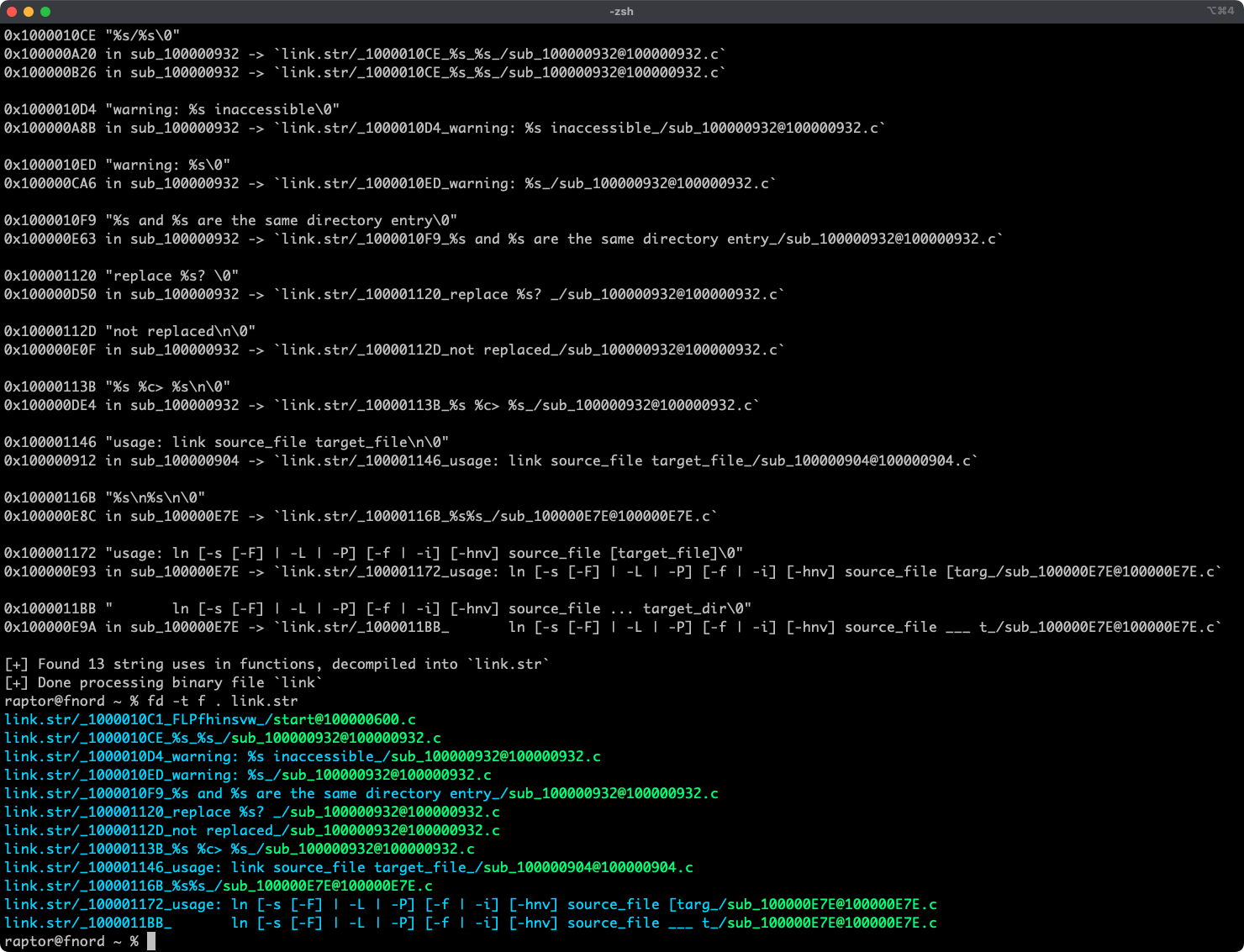https://github.com/0xdea/augur
Reverse engineering assistant that extracts strings and related pseudocode from a binary file.
https://github.com/0xdea/augur
ida-plugin ida-pro idalib reverse-engineering vulnerability-research
Last synced: 7 days ago
JSON representation
Reverse engineering assistant that extracts strings and related pseudocode from a binary file.
- Host: GitHub
- URL: https://github.com/0xdea/augur
- Owner: 0xdea
- License: mit
- Created: 2024-12-13T07:28:00.000Z (about 1 year ago)
- Default Branch: master
- Last Pushed: 2026-01-30T15:43:40.000Z (28 days ago)
- Last Synced: 2026-01-31T08:14:07.787Z (27 days ago)
- Topics: ida-plugin, ida-pro, idalib, reverse-engineering, vulnerability-research
- Language: Rust
- Homepage: https://hex-rays.com/ida-pro
- Size: 115 MB
- Stars: 92
- Watchers: 1
- Forks: 6
- Open Issues: 1
-
Metadata Files:
- Readme: README.md
- Changelog: CHANGELOG.md
- License: LICENSE
Awesome Lists containing this project
- fucking-awesome-rust - 0xdea/augur - Reverse engineering assistant that extracts strings and related pseudo-code from a binary file [](https://github.com/0xdea/augur/actions/workflows/build.yml) (Applications / Security tools)
- awesome-rust - 0xdea/augur - Reverse engineering assistant that extracts strings and related pseudo-code from a binary file [](https://github.com/0xdea/augur/actions/workflows/build.yml) (Applications / Security tools)
- awesome-ida-x64-olly-plugin - augur
- awesome-rust-with-stars - 0xdea/augur - code from a binary file | 2026-01-30 | (Applications / Security tools)
README
# augur
[](https://github.com/0xdea/augur)
[](https://crates.io/crates/augur)
[](https://crates.io/crates/augur)
[](https://hex-rays.com/ida-pro)
[](https://twitter.com/0xdea)
[](https://infosec.exchange/@raptor)
[](https://github.com/0xdea/augur/actions/workflows/build.yml)
[](https://github.com/0xdea/augur/actions/workflows/doc.yml)
> "In fact, I've actually triggered buffer overflows by just entering my real name."
>
> -- A.
Augur is a blazing fast IDA Pro headless plugin that extracts strings and related pseudocode from a binary file.
It stores pseudocode of functions that reference strings in an organized directory tree.

## Features
* Blazing fast, headless user experience courtesy of IDA Pro 9.x and Binarly's idalib Rust bindings.
* Support for binary targets for any architecture implemented by IDA Pro's Hex-Rays decompiler.
* Decompilation feature based on the `decompile_to_file` API exported by [haruspex](https://github.com/0xdea/haruspex).
* Pseudocode of each function that references a specific string is stored in a separate directory.
## Blog posts
*
*
## See also
*
*
*
*
## Installing
The easiest way to get the latest release is via [crates.io](https://crates.io/crates/augur):
1. Download, install, and configure IDA Pro (see ).
2. Install LLVM/Clang (see ).
3. On Linux/macOS, install as follows:
```sh
export IDADIR=/path/to/ida # if not set, the build script will check common locations
cargo install augur
```
On Windows, instead, use the following commands:
```powershell
$env:LIBCLANG_PATH="\path\to\clang+llvm\bin"
$env:PATH="\path\to\ida;$env:PATH"
$env:IDADIR="\path\to\ida" # if not set, the build script will check common locations
cargo install augur
```
## Compiling
Alternatively, you can build from [source](https://github.com/0xdea/augur):
1. Download, install, and configure IDA Pro (see ).
2. Install LLVM/Clang (see ).
3. On Linux/macOS, compile as follows:
```sh
git clone --depth 1 https://github.com/0xdea/augur
cd augur
export IDADIR=/path/to/ida # if not set, the build script will check common locations
cargo build --release
```
On Windows, instead, use the following commands:
```powershell
git clone --depth 1 https://github.com/0xdea/augur
cd augur
$env:LIBCLANG_PATH="\path\to\clang+llvm\bin"
$env:PATH="\path\to\ida;$env:PATH"
$env:IDADIR="\path\to\ida" # if not set, the build script will check common locations
cargo build --release
```
## Usage
1. Make sure IDA Pro is properly configured with a valid license.
2. Run as follows:
```sh
augur
```
3. Find the extracted pseudocode of each decompiled function in the `binary_file.str` directory, organized by string:
```sh
vim .str
code .str
```
## Compatibility
* IDA Pro 9.0.241217 - Latest compatible: v0.2.3.
* IDA Pro 9.1.250226 - Latest compatible: v0.6.2.
* IDA Pro 9.2.250908 - Latest compatible: v0.7.5.
* IDA Pro 9.3.260213 - Latest compatible: current version.
*Note: check [idalib](https://github.com/idalib-rs/idalib) documentation for additional information.*
## Changelog
* [CHANGELOG.md](CHANGELOG.md)
## TODO
* Integrate with [oneiromancer](https://github.com/0xdea/oneiromancer).
* Allow users to choose to process string cross-references even if the decompiler is unavailable.
* Consider converting `traverse_xrefs` to an iterative walk to avoid potential stack overflows and infinite loops.
* Consider integrating [proptest](https://proptest-rs.github.io/proptest/intro.html) to complement unit testing.
* Implement functionality similar to .